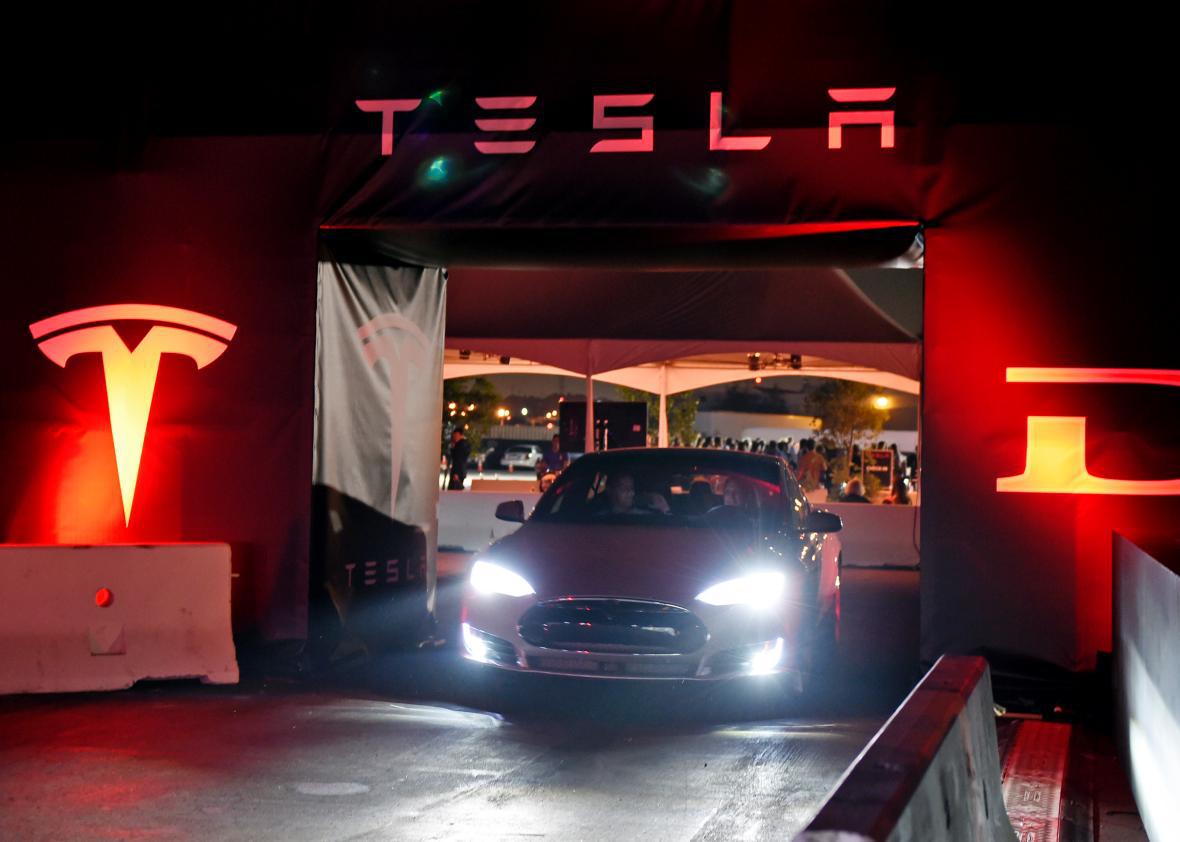On a test drive of a Tesla Model S P90D last fall, I pulled up to a stoplight on Manhattan’s West Side Highway and glanced over to find a McLaren 570 in the next lane. I had the urge to jokingly rev the engine, the universal signal for “let’s drag-race.” Unfortunately, the Tesla Model S’s engine doesn’t really rev, because it’s electric. When the light turned, I punched the gas, just in case the McLaren driver happened to do the same. He did not, thus ending my dream of racing an exotic supercar in a four-door family sedan.
Believe it or not, this is apparently a serious use case in the mind of Tesla CEO Elon Musk. On Tuesday, he announced a new version of the Model S that actually accelerates from zero to 60 mph faster than that McLaren—and every other production car on the market today. (A production car is basically a vehicle that you can buy, as opposed to a concept car.)
The Tesla Model S P100D Ludicrous—yes, that is its actual name—comes with a newly reconfigured 100-kWh battery that will boost its EPA-rated range to 315 miles on a charge and give it a mind-bending zero-to-60 time of 2.5 seconds. The only production cars ever to beat that time, by Tesla’s calculations, are the Ferrari LaFerrari and the Porsche 918 Spyder, neither of which is currently available for sale.
To be precise, this is not the fastest production car on the market: Its top speed is capped at a jaunty-but–not-breathtaking 155 mph. But near-instant acceleration is a virtue of all-electric motors, and in a call with reporters Tuesday, Musk argued that zero-to-60 is “what really matters” if you’re talking about speed you can use on the street, as opposed to on a racetrack.
“For an electric car, one which has four doors, to be the fastest car in production of any kind—I think this is really going to send a great message to the public that sustainable transport is the future,” he said.
It’s safe to say this new Model S is not for everyone. The price starts at $135,000, although the same 100-kWh battery will also be available to existing P90D Ludicrous owners as a $20,000 upgrade. That said, if your goal is simply to beat a McLaren in a drag race, this would probably count as a bargain relative to the other options available.
And if your goal is not to beat a McLaren in a drag race, why should you care about this new Tesla? And, for that matter, why should Tesla care? After all, the company has always insisted that its mission is to help move the world toward sustainable energy sources, not to help reckless rich folks win pink slips.
Asked a version of that question on Tuesday’s conference call, Musk had two answers ready.
First, he said, it’s about the image of electric cars: “The public really pays attention to superlatives, and for the first time, the world’s fastest production car in zero-to-60 is an electric car. I think that is really going to send a great message to the public that sustainable transport is the future.”
Second, he said, pricey offerings like the P100D have always been, for Tesla, a means to subsidize the hard work of building an electric car that the middle class can afford—namely, the forthcoming Model 3: “People who care about the Model 3 should appreciate, if someone’s buying a P100D Ludicrous, they’re helping to pay for their car’s development.”
The 100-kWh pack will also be available on Tesla’s new SUV, the Model X, enabling it to go from zero to 60 in 2.9 seconds.
Impressively, Tesla says the new 100-kWh battery pack is the same external size and shape as its 90-kWh predecessor. The company achieved the performance gains by optimizing the mechanics and the software of the pack, rather than through any kind of technological breakthrough at the level of the individual battery cell. “We did a complete re-do on the cooling architecture,” Chief Technical Officer JB Straubel said.
Musk added that the 100-kWh battery is “very close to the theoretical limit” of what’s possible with current technology in a pack of that size.
